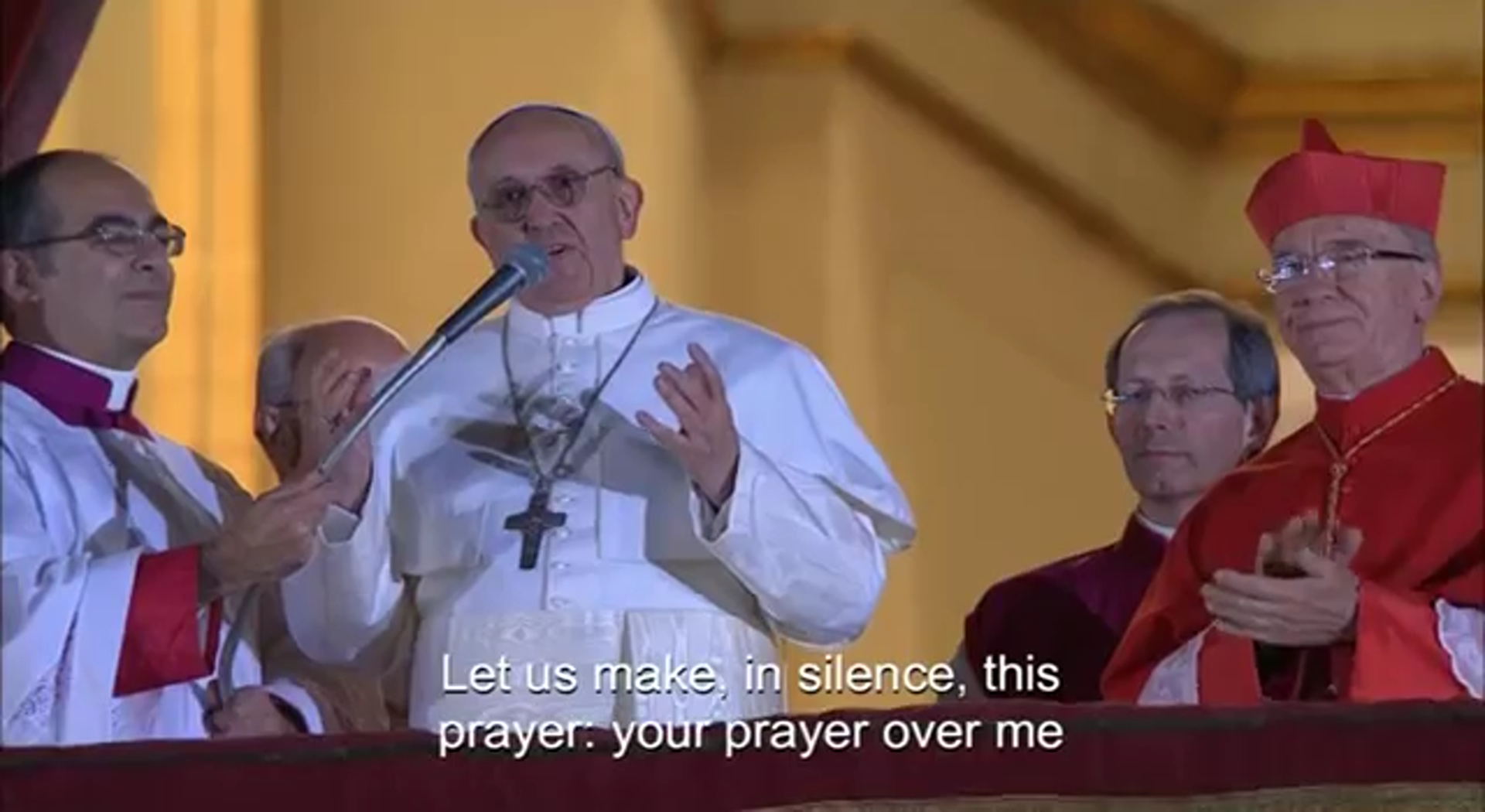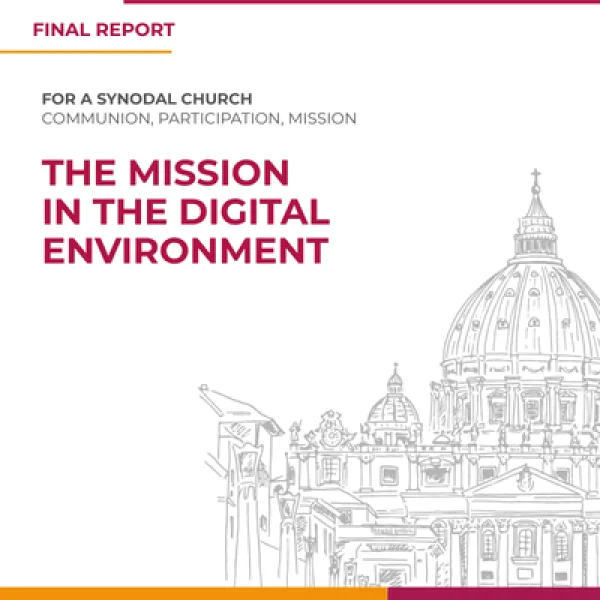- Français
- |
- Booklist
- |
- Week of Prayer
- |
- Links
- Areopagus - a forum for dialogue
- Academic journals
- Acronyms
- Bible tools
- Bibliographies
- Booksellers and publishers
- Churches
- Canadian church headquarters
- Directory of Saskatchewan churches
- Retreat centres
- Saskatchewan church and non-profit agencies
- Ecumenism.net Denominational links
- Anabaptist & Mennonite
- Anglican
- Baptist
- Evangelical
- Independent episcopal
- Lutheran
- Methodist, Wesleyan, and Holiness
- Miscellaneous
- Mormon
- Orthodox (Eastern & Oriental)
- Para-church ministries
- Pentecostal / charismatic
- Presbyterian & Reformed
- Quaker (Society of Friends)
- Roman & Eastern Catholic
- United and uniting
- Documents of Ecumenical Interest
- Ecumenical agencies
- Ecumenical Booklist
- Ecumenical Dialogues
- Glossary
- Human rights
- Inter-religious links
- Justice & peace
- Lectionaries
- Religious news services
- Resource pages
- Search Ecumenism.Net
- |
- Documents
- Ancient & Medieval texts
- Ecumenical Dialogues
- Interreligious
- Anabaptist & Mennonite
- Anglican
- Evangelical
- Lutheran
- Orthodox
- Reformed & Presbyterian
- Roman & Eastern Catholic
- United & Uniting
- Miscellaneous churches
- Canadian Council of Churches (CCC)
- Conference of European Churches (CEC)
- Interchurch Families International Network (IFIN)
- National Council of Churches in Australia (NCCA)
- Lausanne Committee for World Evangelism (LCWE)
- World Council of Churches (WCC)
- Other ecumenical documents
Church traditions
Documents from ecumenical agencies
- |
- Dialogues
- Adventist-Reformed
- African Instituted Churches-Reformed
- Anglican-Lutheran
- Anglican-Orthodox
- Anglican-Reformed
- Anglican-Roman Catholic
- Anglican-United/Uniting
- Baptist-Reformed
- Disciples of Christ-Reformed
- Disciples of Christ-Roman Catholic
- Evangelical-Roman Catholic
- Lutheran-Mennonite
- Lutheran-Mennonite-Roman Catholic
- Lutheran-Reformed
- Lutheran-Roman Catholic
- Mennonite-Reformed
- Mennonite-Roman Catholic
- Methodist-Reformed
- Methodist-Roman Catholic
- Oriental Orthodox-Reformed
- Orthodox-Reformed
- Orthodox-Roman Catholic
- Pentecostal-Reformed
- Prague Consultations
- REC-WARC Consultations
- Roman Catholic-Lutheran-Reformed
- Roman Catholic-Reformed
- Roman Catholic-United Church of Canada
- |
- Quick links
- Canadian Centre for Ecumenism
- Canadian Council of Churches
- Ecumenical Shared Ministries
- Ecumenism in Canada
- Interchurch Families International Network
- International Anglican-Roman Catholic Commission for Unity and Mission
- Kairos: Canadian Ecumenical Justice Initiatives
- North American Academy of Ecumenists
- Prairie Centre for Ecumenism
- Réseau œcuménique justice et paix
- Week of Prayer for Christian Unity
- Women's Interchurch Council of Canada
- World Council of Churches
- |
- Archives
- |
- About us
The Mission in the Digital Environment
Executive Summary
God calls every baptized person to proclaim the Good News, entrusting this missionary mandate to all. Within our missionary Church, charisms have historically developed to live out this mission in response to the needs of different times and cultures. In the present historical moment, the Final Document of the XVI Ordinary General Assembly of the Synod of Bishops (FD), now part of the Ordinary Magisterium of the Pope, has recognized the digital environment as a culture, with its own dynamics, languages, and modes of interaction. In this perspective, the Synod affirms that “digital culture constitutes a crucial dimension of the Church’s witness in contemporary culture and an emerging missionary field” (FD, no. 149).
- This Executive Summary in ENG – ESP – FRA – ITA – POR
- The full Final Report of Study Group 3 in ENGLISH or in ITALIAN
- The Final Document of the Synod of Bishops (Oct. 2024)
- Pathways for the Implementation Phase of the Synod (July 2025)
We all, as the baptized, are called to bring the Good News to people we meet in this environment through missionary approaches that respond to its specific characteristics, engaging its opportunities while facing its challenges and risks directly.
Continuing the path opened by his Predecessor, Pope Leo XIV invited the participants in the Jubilee of Digital Missionaries and Catholic Influencers to “renew your commitment to nourish Christian hope in social networks and online spaces”.[1] Pope Leo XIV has affirmed that “we need missionary disciples who convey the gift of the Risen Lord to the world; who voice to the ends of the earth the hope that Jesus gives us (cf. Acts 1:3-8); and who go wherever there is a heart that waits, seeks, and is in need. […] Always look for the “suffering flesh of Christ” in every brother and sister you encounter online”.[2] The Pope has likewise emphasized that “we need to discern how to use digital platforms to evangelize, to form communities and to challenge the false gods of consumerism, power and self-sufficiency”.[3]
Over the course of both Synodal Assemblies, the Synod identified a growing call to understand how the Church’s mission can best be lived out in this digital era. This theme was articulated in Chapter 17 of the Synthesis Report of the First Session of the Sixteenth Ordinary General Assembly of the Synod of Bishops (SR, no. 17), and, more explicitly, in paragraphs 58, 59, 113, and 149 of the Final Document.
Study Group 3 was entrusted with the task of identifying concrete ways through which the Church’s digital mission might be faithfully carried forward. Our work has focused on how the Church is already witnessing and can most effectively continue to witness to the Gospel of Jesus Christ in a time in which digital and physical environments are closely interconnected in every area of social life, especially among young people. This digital revolution stands at the heart of an epochal shift, one that challenges us to respond faithfully and to carry out our Gospel mission in this new context.[4]
Pursuant to this mandate, our Group sought to address the questions[5] set forth by the General Secretariat of the Synod[6] concerning how the Church can learn from, engage with, and carry forward its mission within the digital environment. Our Group shared these questions with diverse groups and individuals around the world, reflecting the Church’s ongoing commitment to listening and dialogue.
It is important to acknowledge from the start that even with this broad consultation, our conclusions are preliminary. The Church has been engaged in the digital environment from its beginning, yet fostering this engagement across all levels of the Church takes time. As digital technology continues to evolve, the Church’s discernment of how to live her mission remains an ongoing journey rather than a finished task.
At the same time, we learned a great deal during our extensive synodal consultation and listening efforts. This report identifies many current expressions of mission in a time so characterized by digital technology and continuous innovations, and draws from them valuable lessons learned to date. Building on these insights, we offer concrete suggestions for how the Church can continue to advance the mission of proclaiming the Gospel in the digital world and live out this new chapter in her missionary history. Five themes frame our recommendations:
- First, the digital environment is not merely a set of tools to be mastered; it is a culture. Understanding it involves understanding how we relate to one another, how we form community, and ultimately how we share the Gospel in a world that is increasingly digitally mediated (cf. FD, no. 113a).
- Second, digital engagement enables listening to, accompanying, and raising the voices of those whose voices are not heard, and is an expression of the Church’s social mission. We have consistently heard that the digital environment can be a place where people genuinely search for God and express deep spiritual needs (cfr. SR, no. 17b). It can therefore be a way of living out the Church’s social mission, and a new dimension of the preferential option for the poor.
Pope Francis’s vision of a “field hospital” Church that goes out to the peripheries is reflected in the work of missionaries in the digital environment, ready to respond to suffering individuals. Digital spaces can then become places of genuine human connection, not just information exchange. At its best, digital engagement does not replace in-person encounters but can instead lead to them, enriching relationships and communities. As Pope Leo emphasizes, “our mission – your mission – is to nurture a culture of Christian humanism, and to do so together. This is the beauty of the “network” for all of us”.[7] - Third, this digital culture requires the same intentionality, formation, and missionary spirit that we bring to any cross-cultural ministry. Just as missionaries throughout history have learned languages, understood customs, and adapted their approaches while maintaining the integrity of the Gospel, all the baptized are called to be salt and leaven in this new culture, remaining rooted in the truth, goodness, and beauty of our Catholic faith (cf. FD, no. 59).
- Fourth, at its best, digital engagement naturally fosters elements of synodality: listening, participation, and shared responsibility. At its best, online engagement enables unprecedented opportunities to hear diverse voices from different backgrounds, geographic areas, and perspectives – especially those often marginalized in traditional Church settings. At its best, digital culture can reflect something of the Church’s own identity as a network of networks, reflecting the unity in diversity that is the hallmark of the body of Christ (cf. FD, no. 149).[8]
- Fifth, at the same time, the digital environment poses immense challenges. It presents great risks, and is shaped through algorithms that can isolate us in echo chambers and manipulate us; by business models that monetize our attention and monitor our actions; and by dynamics that foster polarization rather than communion, and can drive nihilism and violence. The same platforms that enable connection can also enable dehumanization. This is why in the digital age we are called to live our faith maturely and prayerfully in face-to-face communities, nourished by the sacraments, and to foster in-person and digital interactions which respect human dignity, promote authentic encounter, and witness to the truth in love. This is especially true for young people who often encounter the faith first online. As Pope Leo XIV warns, a faith discovered only in digital spaces risks remaining “disembodied,” never rooted in real relationships or the life of the Church, and can leave individuals “alone with themselves” in algorithm-shaped isolation.[9]
These convergences are the result of our synodal work of listening and dialogue with many individuals and groups, including episcopal conferences, those involved in synodal processes, scholars and experts, young people, and those involved intentionally in the digital mission. This synodal consultation resulted in a more particularized series of insights and recommendations that we summarize in detail in the full report.
Like any new path, the common mission in the digital environment is a journey in progress. The Church is learning along the way the challenges, opportunities, and languages presented by this emerging culture. Concepts such as digital mission, online synodality, jurisdiction, and digital accompaniment and discernment require deeper study to illuminate their theological, pastoral, and canonical meaning. Continued reflection is also needed regarding the formation and engagement of those on this digital mission. This process of learning and discernment is, in itself, a synodal experience, as we walk together to discern how the Holy Spirit continues to guide the Church to embody the Gospel with faithfulness and creativity, making digital culture a space of encounter, witness, and communion.
The mission in the digital environment is part of the pastoral, missionary, and synodal conversion process to which the Holy Spirit is calling the Church today. It is not merely about using digital tools to proclaim the Gospel, but about embodying this proclamation within the cultural evolution in the digital environment, where relationships, languages, and forms of community take on new and particular configurations. The Church’s presence in the digital sphere can be a sign of communion and a witness of hope, capable of reflecting the merciful face of Christ. May this discernment help strengthen a more synodal, participatory, and missionary Church, faithful to its vocation of announcing the Gospel with creativity and fidelity.
[1] Leo XIV, Address to Catholic Digital Missionaries and Influencers, 29 July 2025.
[2] Ibid.
[3] Leo XIV, Address to the Major Superiors of the Society of Jesus, 24 October 2025.
[4] Ibid.
[5] (1) What can a synodal missionary Church learn from a deeper immersion in the digital environment; (2) How can the digital mission be more routinely integrated into the life of the Church and its ecclesial structures, deepening the implications of the new digital missionary frontier for the renewal of existing parish and diocesan structures (cf. SR, no. 17j); (3) What adaptation to the digital environment is required by the notion of jurisdiction primarily linked to a geographic territory; (4) What practical recommendations or proposals are there concerning the Church’s mission in the digital environment; (5) Would you like to share any other contribution or good practice on this topic? Or perhaps add any other issue or challenge that should be addressed in this journey of study and reflection?
[6] General Secretariat of the Synod, Study Groups for questions raised in the First Session of the XVI Ordinary General Assembly of the Synod of Bishops to be explored in collaboration with the Dicasteries of the Roman Curia. Work Outline, 14 March 2024, section 3: “The mission in the digital environment”.
[7] Leo XIV, Address to Digital Missionaries…, cit.
[8] One excellent example of this is the “Building Bridges” initiative launched in 2022 between multiple Vatican offices and universities in North and South America where students were invited to participate in synodal style listening sessions between the continents and that ultimately included a virtual conversation with Pope Francis. This model was later expanded and replicated to include students, professors, pastors and universities in Africa and Asia Pacific. Cf. Pope encourages students from the Americas to build better world, 24 February 2022, Vatican News, www.vaticannews.va/en/pope/news/2022-02/pope-encourages-students-from-the-americas-to-build-better-world.html.
[9] Leo XIV, Address to the members of the International Youth Advisory Body, 31 October 2025.

 Permanent link: ecumenism.net/?p=14864
Permanent link: ecumenism.net/?p=14864
Categories: Documents, News • In this article: digital environment, General Secretariat for the Synod, mission, Vatican

 Lien permanente : ecumenism.net/?p=14864
Lien permanente : ecumenism.net/?p=14864
Catégorie : Documents, News • Dans cet article : digital environment, General Secretariat for the Synod, mission, Vatican

Now Hiring! General Secretary of the Canadian Council of Churches
— Mar. 2, 20262 mars 2026
Has your faith commitment and organizing experience prepared you or someone you know for this leadership role?
The Canadian Council of Churches is seeking an individual to fill the role of General Secretary on a full-time basis for a 5-year renewable term, beginning September 1, 2026.
The Canadian Council of Churches (the Council) is a broad and inclusive ecumenical body, now representing 26 member churches including Anglican; Eastern and Roman Catholic; Evangelical; Free Church; Eastern and Oriental Orthodox; and Historic Protestant traditions.
… Read more » … lire la suite »
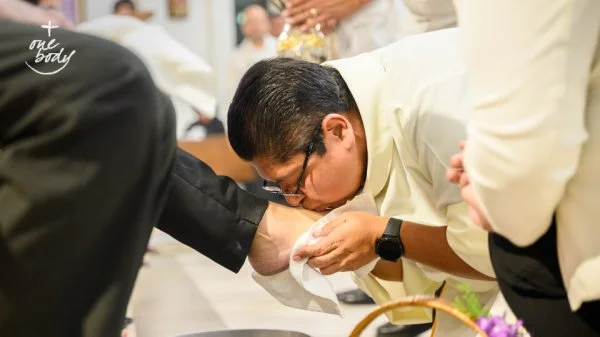
Baptism, Footwashing, and Mission | One Body
— Feb. 26, 202626 févr. 2026
What if footwashing were a sacrament? Of all of the things that Jesus instructed the disciples to do, why didn’t footwashing become a sacrament like the others? Thoughts like these are one of the hazards of being a theologian.
I was thinking about this strange idea this week while reflecting on Pope Leo XIV’s new series of catecheses on Vatican II. Just when he is encouraging us to re-read the documents of the Council, the CCCB has issued a new National Strategy on Ecumenism. The first step in this strategy is to focus on education and formation about the church’s ecumenical teaching, beginning with the Council.
… Read more » … lire la suite »

Ukraine, Canada, and the Church: Calls to action and prayer
— Feb. 24, 202624 févr. 2026
As we approach the fourth anniversary of Russia’s full-scale invasion of Ukraine and the twelfth anniversary of its illegal occupation of Crimea and parts of eastern Ukraine, we once again address Canadian Christians with urgency, grief, and hope. These calls to action build on the witness offered in February 2024 when we released A Canadian Pastoral Letter on Ukraine, Canada and the Church. It arises from relationships of shared prayer, co-suffering, and discernment among Ukrainian Orthodox, Ukrainian Catholic, Evangelical, and other Christian leaders, together with the World Evangelical Alliance Peace & Reconciliation Network, The Evangelical Fellowship of Canada, and The Canadian Council of Churches. We write again because the war continues, suffering deepens, and faithful Christian witness remains urgently needed.
… Read more » … lire la suite »
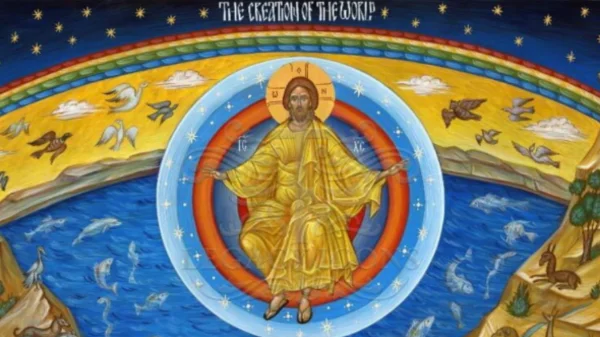
Churches Worldwide to Celebrate Feast of Creation
— Feb. 20, 202620 févr. 2026
A growing ecumenical movement is reshaping church calendars worldwide. The Feast of Creation — celebrated annually on Sept. 1 and also known as Creation Day or the World Day of Prayer for Creation — is being formally added to the liturgical calendars of many churches.
The World Communion of Reformed Churches is supporting the initiative alongside the World Council of Churches, Middle East Council of Churches, Anglican Communion, Lutheran World Federation, and the World Methodist Council.
… Read more » … lire la suite »
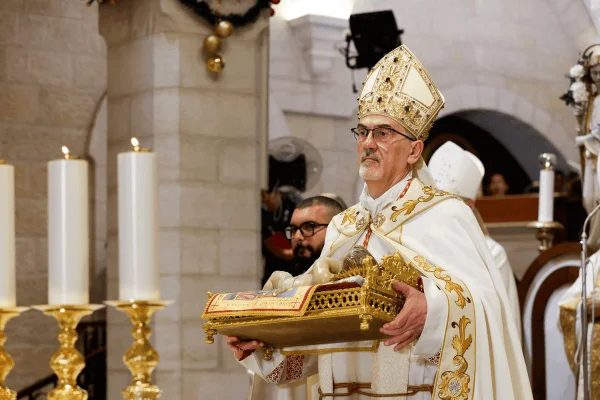
Board of Peace a ‘colonialist operation’: Cardinal
— Feb. 18, 202618 févr. 2026
Cardinal Pierbattista Pizzaballa, Latin patriarch of Jerusalem, strongly criticised the U.S.-led Board of Peace, an international body chaired by President Donald Trump to oversee the governance and reconstruction of Gaza. During an event at the Roman parish of San Francesco a Ripa Grande, Pizzaballa was asked by moderator Maria Gianniti, Rome correspondent for the Italian news channel RAI, about his thoughts on the Board of Peace.
“What do I think of the Board of Peace? I think it is a colonialist operation: others deciding for the Palestinians,” Pizzaballa said, according to a report by Italian newspaper Il Sole 24 Ore. The cardinal also commented on the invitation extended to the Vatican to join the international body and its $1-billion price tag for a permanent seat on the board.
… Read more » … lire la suite »
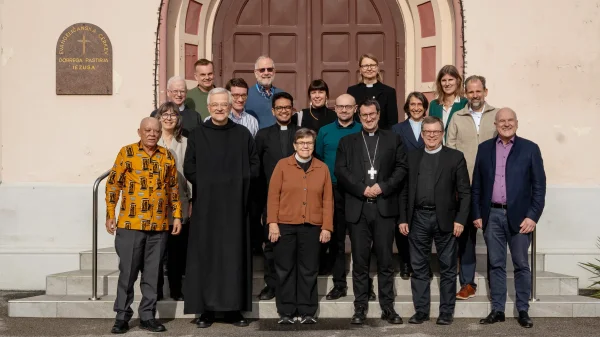
Lutherans and Catholics explore deep ecumenical potential of Augsburg Confession
— Feb. 12, 202612 févr. 2026
Catholic and Lutheran theologians meet in Slovenia to begin drafting a joint statement marking the 500th anniversary of the Augsburg Confession.
The launch of the Sixth Phase of the International Lutheran-Catholic Commission on Unity bears fruit in Slovenia.
“We discerned new perspectives and highlighted the deep ecumenical potential of the Augsburg Confession,” said Prof. Dr Dirk Lange, The Lutheran World Federation (LWF) Assistant General Secretary for Ecumenical Relations, following the launch of a new phase of theological dialogue with the Roman Catholic Church.
… Read more » … lire la suite »
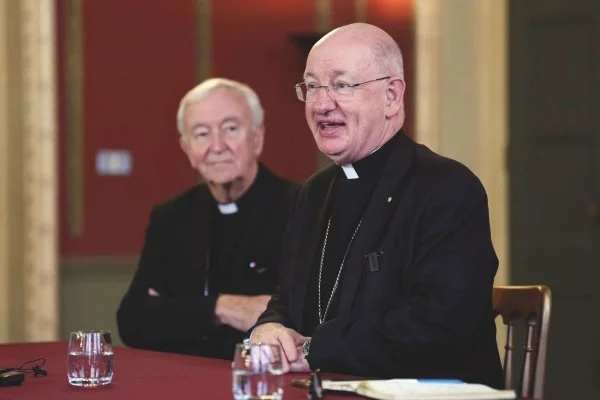
A paradigm shift for English Catholicism
— Feb. 11, 202611 févr. 2026
What is the Catholic Church in England and Wales for, exactly? Some might insist existence is enough and no more needs to be said. When the Catholic Church taught extra ecclesiam nulla salus without qualification, that was clearly an imperative. But the Catechism now states: “Those who, through no fault of their own, do not know the Gospel of Christ or his Church, but who nevertheless seek God with a sincere heart, and, moved by grace, try in their actions to do his will as they know it through the dictates of their conscience – those too may achieve eternal salvation” (quoting Lumen Gentium, 16). Paradise is open to all people of sincere goodwill. So why be Catholic? It is not a question that has yet been fully answered.
… Read more » … lire la suite »
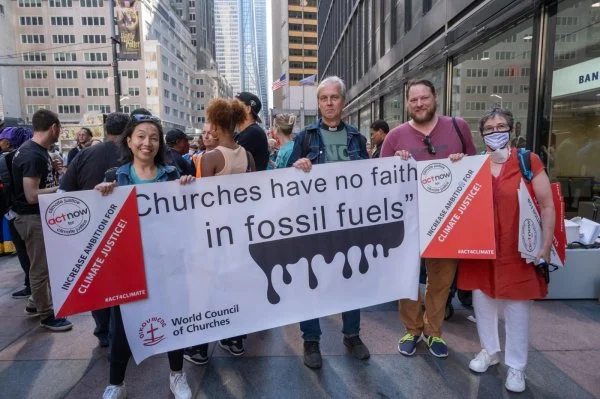
WCC launches ‘Ten Commandments of Climate-Responsible Banking,’ encouraging faith communities to divest from fossil fuels
— Feb. 6, 20266 févr. 2026
The World Council of Churches (WCC) has released a new resource, Ten Commandments of Climate-Responsible Banking, calling on individuals, churches, and faith-based organizations to align their financial choices with climate justice and the wellbeing of future generations.
The guide stresses that money entrusted to banks is often invested in industries driving the climate crisis and urges believers to use their economic influence to support a transition away from fossil fuels and toward sustainable alternatives.
… Read more » … lire la suite »
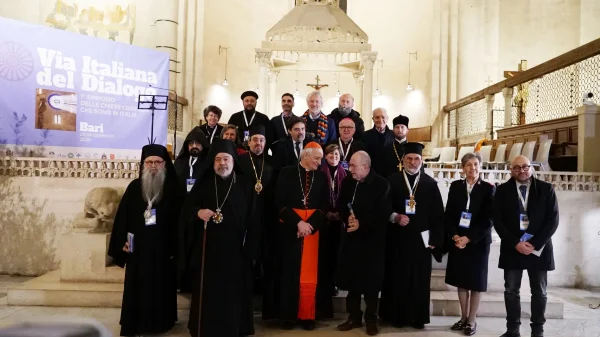
Italy’s Christian churches sign first ecumenical pact
— Feb. 5, 20265 févr. 2026
Strengthening relations among different Christian churches in Italy, while promoting authentic Christian values within an increasingly secular society. Those were the twin goals of a recent symposium, during which representatives of eighteen churches and Christian communities signed an ecumenical pact pledging to pursue dialogue, joint witness and closer cooperation for the common good.
As dean of the Evangelical Lutheran Church in Italy, Rev. Carsten Gerdes took part in the two-day symposium, held in the southern port city of Bari. The gathering included the signing of a bold new agreement between Catholic, Orthodox, Anglican, Protestant, Pentecostal and Free churches present around the Italian peninsula.
… Read more » … lire la suite »
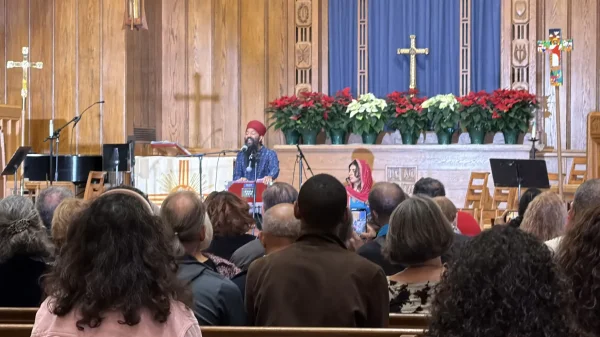
Interfaith Harmony Week: Standing together against rising religious nationalism
— Feb. 3, 20263 févr. 2026
To mark the 1 to 7 February World Interfaith Harmony Week, LWF’s director for Theology, Mission and Justice reflects on the need to stand united against division and hatred, tending the flame of hope together.
When the United Nations launched the World Interfaith Harmony Week in 2010, the vision was for a week globally dedicated to highlighting common values across faith traditions, including all people of goodwill — love of God, love of the good, and love of neighbour. Sixteen years later, as we observe this week again, the onslaught of the unending bad news reminds me how the world has shifted dramatically. The challenge before us is no longer simply about dialogue and understanding. It’s about solidarity and cooperation for the common good in the face of rising religious nationalism globally.
… Read more » … lire la suite »






